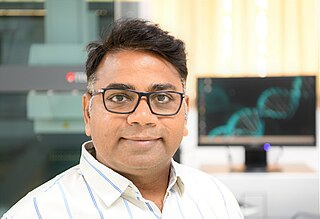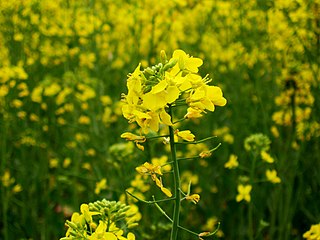
Eleusine coracana, or finger millet, also known as ragi in India, kodo in Nepal, is an annual herbaceous plant widely grown as a cereal crop in the arid and semiarid areas in Africa and Asia. It is a tetraploid and self-pollinating species probably evolved from its wild relative Eleusine africana.

Safflower is a highly branched, herbaceous, thistle-like annual plant in the family Asteraceae. It is commercially cultivated for vegetable oil extracted from the seeds and was used by the early Spanish colonies along the Rio Grande as a substitute for saffron. Plants are 30 to 150 cm tall with globular flower heads having yellow, orange, or red flowers. Each branch will usually have from one to five flower heads containing 15 to 20 seeds per head. Safflower is native to arid environments having seasonal rain. It grows a deep taproot which enables it to thrive in such environments.

The International Crops Research Institute for the Semi-Arid Tropics (ICRISAT) is an international organization which conducts agricultural research for rural development, headquartered in Patancheru with several regional centers (Bamako, Nairobi and research stations (Niamey, Kano, Lilongwe, Addis Ababa, Bulawayo . It was founded in 1972 by a consortium of organisations convened by the Ford and the Rockefeller foundations. Its charter was signed by the FAO and the UNDP.
Pongamia oil is derived from the seeds of the Millettia pinnata tree, which is native to tropical and temperate Asia. Millettia pinnata, also known as Pongamia pinnata or Pongamia glabra, is common throughout Asia and thus has many different names in different languages, many of which have come to be used in English to describe the seed oil derived from M. pinnata; Pongamia is often used as the generic name for the tree and is derived from the genus the tree was originally placed in. Other names for this oil include honge oil, kanuga oil, karanja oil, and pungai oil.

Millettia pinnata is a species of tree in the pea family, Fabaceae, native to eastern and tropical Asia, Australia, and Pacific islands. It is often known by the synonym Pongamia pinnata. Its common names include Indian beech and Pongame oiltree.

Commercial sorghum is the cultivation and commercial exploitation of species of grasses within the genus Sorghum. These plants are used for grain, fibre and fodder. The plants are cultivated in warmer climates worldwide. Commercial Sorghum species are native to tropical and subtropical regions of Africa and Asia.

Jatropha curcas is a species of flowering plant in the spurge family, Euphorbiaceae, that is native to the American tropics, most likely Mexico and Central America. It is originally native to the tropical areas of the Americas from Mexico to Argentina, and has been spread throughout the world in tropical and subtropical regions around the world, becoming naturalized or invasive in many areas. The specific epithet, "curcas", was first used by Portuguese doc Garcia de Orta more than 400 years ago. Common names in English include physic nut, Barbados nut, poison nut, bubble bush or purging nut. In parts of Africa and areas in Asia such as India it is often known as "castor oil plant" or "hedge castor oil plant", but it is not the same as the usual castor oil plant, Ricinus communis.
Nimbkar Agricultural Research Institute (NARI) is a non-governmental organisation and non-profit research and development institute in Tambmal, Phaltan, Maharashtra, India. (NARI) undertakes research and development in the fields of agriculture, renewable energy, animal husbandry and sustainable development. Shri B. V. Nimbkar founded the institute in 1968, who remained its president until 1990. Currently, Dr. Anil K. Rajvanshi is the director of the institute whereas Dr. Nandini Nimbkar is the president.

Rajeev Kumar Varshney is an Indian agricultural scientist, specializing in genomics, genetics, molecular breeding and capacity building in developing countries. Varshney is currently serving as Director, Western Australian State Agricultural Biotechnology Center; Director, Centre for Crop & Food Innovation; and International Chair in Agriculture & Food Security with the Food Futures Institute at Murdoch University, Australia since Feb 2022. Before joining Murdoch University, Australia he served International Crops Research Institute for the Semi-Arid Tropics (ICRISAT), a global agriculture R&D institute, for more than 16 years in different scientific and research leadership roles including Research Program Director for three global research programs– Grain Legumes, Genetic Gains and Accelerated Crop Improvement Program. He has the onus of establishing and nurturing the Center of Excellence in Genomics & Systems Biology (CEGSB), a globally recognized center for genomics research at ICRISAT that made impacts on improving agriculture and development of human resources in several countries including India, China, Kenya, Ethiopia, Tanzania, Nigeria, Ghana, Mali, Senegal, Burkina Faso, etc. Varshney holds Adjunct/Honorary/Visiting Professor positions at 10 academic institutions in Australia, China, Ghana, Hong Kong and India, including The University of Western Australia, University of Queensland, West Africa Centre for Crop Improvement, University of Hyderabad, Chaudhary Charan Singh University and Professor Jayashankar Telangana State Agricultural University.
P. Ananda Kumar is an Indian plant molecular biologist and biotechnologist.

The Indian Institute of Horticultural Research (IIHR) is an autonomous organization acting as a nodal agency for basic, strategic, anticipatory and applied research on various aspects of horticulture such as fruits, vegetable, ornamental, medicinal and aromatic plants and mushrooms in India. The institute has its headquarters in Bengaluru, Karnataka, India and is a subsidiary of Indian Council of Agricultural Research (ICAR), New Delhi, under the Ministry of Agriculture, India. It recently has been ranked 1st for the combined years 2019-20 and 2020-21 by the ICAR.
Commission for Agricultural Costs and Prices (CACP) is a decentralised agency of the Government of India. It was established in 1965 as the Agricultural Prices Commission, and was given its present name in 1985. It is an advisory body, not statutory, attached to the Ministry of Agriculture & Farmers Welfare, Government of India.

Khem Singh Gill was an Indian academic, geneticist, plant breeder and Vice-Chancellor of the Punjab Agricultural University. He was known for his contributions to the Green Revolution in India. Instrumental for breeding new strains of wheat, linseed, and sesame, he was the author of the book Research on wheat and triticale in the Punjab along with several additional articles on the subject. He was also the vice-president of The Kalgidhar Trust and The Kalgidhar Society, Baru Sahib, which is one of the largest Sikh charities. A Sant Teja Singh Chair Professor in Sikhism of the Eternal Global University and a founding fellow of The World Academy of Sciences, he was a recipient of Rafi Ahmad Kidwai Memorial Prize, Team Research Award of the Indian Council of Agricultural Research (ICAR), FICCI Award, ICAR Golden Jubilee Award and Silver Jubilee Award of the Indian Society of Oilseeds Research. In 1992, the Government of India awarded him the third highest civilian honor of the Padma Bhushan for his contributions to science.

Kaderbad Ravindranath is an Indian agricultural research scientist and cotton breeder. In 2015, he received the Life Time Achievement Award for his contributions to the cotton research.
Neelamraju Ganga Prasada Rao was an Indian geneticist and plant breeder, known for his efforts in developing hybrid varieties of sorghum, which earned him the moniker, the Father of Hybrid Sorghum. He was the vice chancellor of Vasantrao Naik Marathwada Agricultural University and chaired the Agricultural Scientists Recruitment Board of the Indian Council of Agricultural Research. He was a recipient of several national honors including Rafi Ahmed Kidwai Award and the VASVIK Industrial Research Award. The Council of Scientific and Industrial Research, the apex agency of the Government of India for scientific research, awarded him the Shanti Swarup Bhatnagar Prize for Science and Technology, one of the highest Indian science awards, in 1966, for his contributions to biological sciences.

Australian wheatbelts comprise inland agricultural regions across southern and eastern Australia. The regions are named for wheat, which was the main agricultural product in the early history of Australia's development; today, many other crops are also produced.
The Indian Institute of Millets Research (ICAR-IIMR) located at Rajendranagar is an agricultural research institute engaged in basic and strategic research on sorghum and other millets. IIMR operates under the aegis of Indian Council of Agricultural Research (ICAR). It conducts agricultural research on Millets breeding, improvement, pathology and value addition. IIMR coordinates and facilitates sorghum research at national level through the All India Coordinated Research Projects on Sorghum and provides linkages with various national and international agencies.

Dhara Mustard Hybrid-11, otherwise known as DMH - 11, is a genetically modified hybrid variety of the mustard species Brassica juncea. It was developed by Professor Deepak Pental from the University of Delhi, with the aim of reducing India's demand for edible oil imports. DMH - 11 was created through transgenic technology, primarily involving the Bar, Barnase and Barstar gene system. The Barnase gene confers male sterility, while the Barstar gene restores DMH - 11's ability to produce fertile seeds. The insertion of the third gene Bar, enables DMH - 11 to produce phosphinothricin-N- acetyl-transferase, the enzyme responsible for Glufosinate resistance. This hybrid mustard variety has come under intense public scrutiny, mainly due to concerns regarding DMH - 11's potential to adversely affect the environment as well as consumer health. DMH - 11 was found not to pose any food allergy risks, and has demonstrated increased yields over existing mustard varieties. Conflicting details and results regarding the field trials and safety evaluations conducted on DMH - 11 have delayed its approval for commercial cropping.

S Prakash Tiwari is an Indian biotechnologist, geneticist, agriculturalist and a former Deputy Director General of the Indian Council of Agricultural Research (ICAR). He was Vice-Chancellor of Swami Keshwanand Rajasthan Agricultural University, Bikaner, and Director of National Academy of Agricultural Research Management (NAARM), Hyderabad. He is also a former director of National Research Centre on Soybean, Indore.













